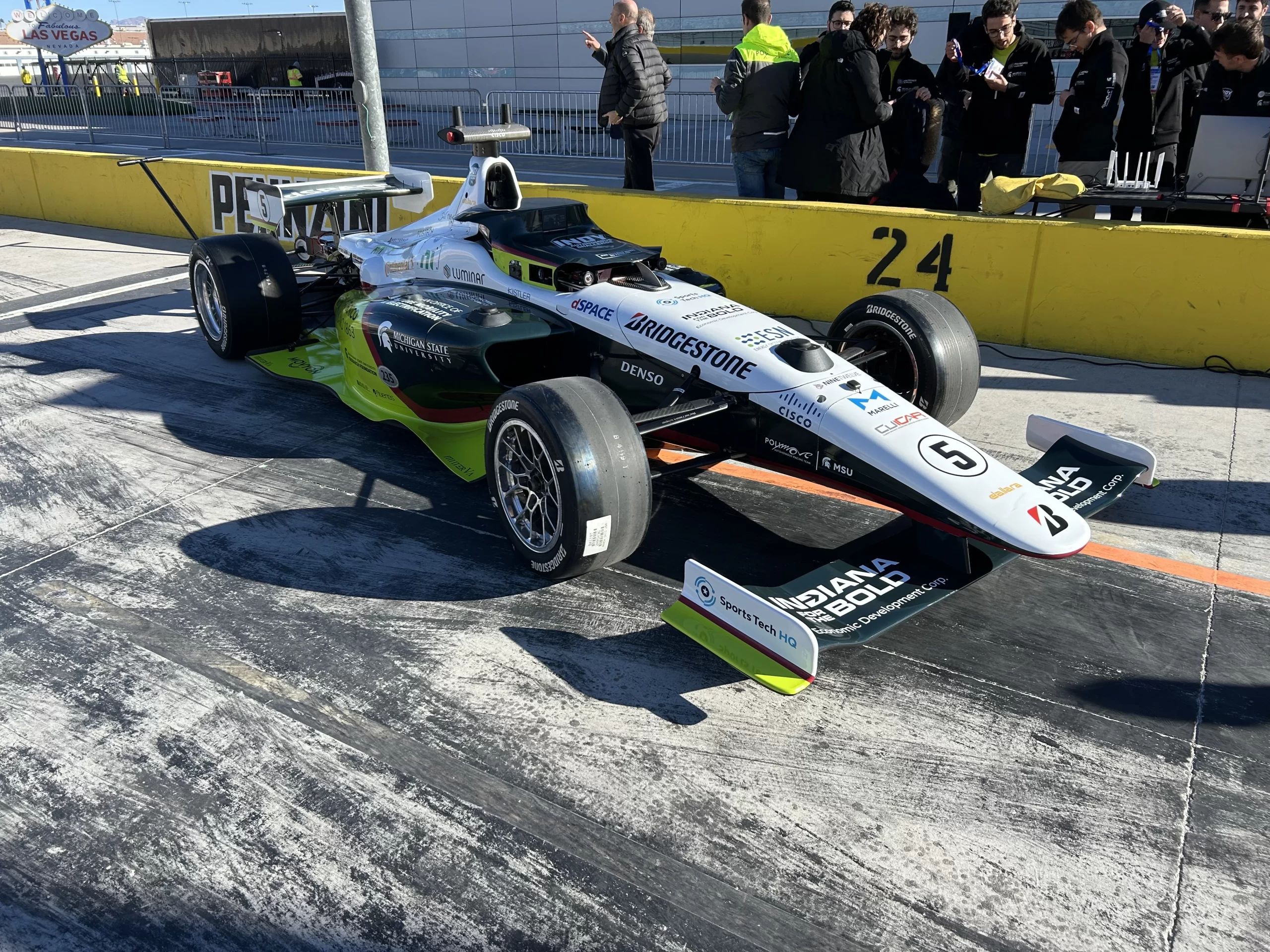Team PoliMOVE-MSU, a collaborative team of students and faculty from Michigan State University and Politecnico di Milano, was one of four teams to qualify for a first-of-its-kind multicar racing event at the 2025 Indy Autonomous Challenge, or IAC, held during the Consumer Technology Association’s annual tech trade show, CES 2025, on Jan. 9.

The new event featured cars racing head-to-head in a 20-lap, open-racing format. This was the first time the IAC featured more than two cars racing simultaneously and pushed the limits of the participating teams’ AI drivers’ multi-agent interaction capabilities at high speeds. Prequalification runs took place throughout the week to determine which tier — specifically, which event — each team would be participating in based on performance. Team PoliMOVE-MSU clinched a top spot in the newest IAC competition.
“The IAC took it up a notch this year by introducing the 20-lap, head-to-head event, and it was an incredible opportunity to see the speed, handling and sophistication of these race cars and the potential of AI in high-speed motorsports,” said Judd Herzer, mobility director at MSU. “We are proud that MSU was one of just four teams that qualified for this historic milestone of competing in a more traditional Indianapolis 500-style racing event with autonomous vehicles.”
On the track at the Las Vegas Motor Speedway, the team put its AV-24 race car — piloted by its team-programmed artificial intelligence driver — to the test, competing against three other teams. Team PoliMOVE-MSU had trouble rebooting its sensors after all teams experienced a power surge event, effectively shutting off vehicle sensors during the first lap, resulting in the team crossing the finish line in fourth place.
In addition to the milestone event, six other teams from various universities participated in two other competitions based on their respective tiered positions: time trials and a passing competition.
MSU joined the PoliMOVE-MSU team in December 2023. The IAC AV-24 race cars are retrofitted with hardware and controls to enable autonomous control, with AI drivers programmed by team members. Through its advanced technology, IAC offers a glimpse into the future of mobility, with autonomous Indy-style, driverless, high-powered race cars reaching speeds near 200 mph.
“While the IAC races are exciting to watch, more importantly, there is a lot that goes into training the vehicles and a lot of strategic and on-the-fly problem-solving that goes into it, providing young talent with an exceptional opportunity to learn, innovate and test new generations of automated vehicle software,” said Herzer. “It highlights one of many experiential learning opportunities available on MSU’s campus that enable students to apply classroom knowledge, deepen their understanding of cutting-edge technologies and develop practical skills in a collaborative, team-focused environment.”
In addition to participating in the IAC event, several MSU Mobility and College of Engineering faculty and team members participated in a series of CES conference sessions, where they explored the future of autonomous driving, AI and other advanced technologies.
Current sponsors and partners of the PoliMOVE-MSU team include the DENSO North America Foundation, Michigan Office of Future Mobility and Electrification and the Michigan State University Research Foundation. For corporations interested in learning more, becoming involved and/or sponsoring the team, please reach out to David Bertram.
This story was originally published by Michigan State University.
Is your company interested in working with MSU’s innovative automotive researchers? Click Here.
About the MSU Innovation Center:
The MSU Innovation Center combines research partnerships, technology transfer, and startup support for MSU faculty who aim to see their research applied to make the world a better place.
Composed of Business Connect, MSU Technologies, and Spartan Innovations, the MSU Innovation Center aims to amplify the impact of faculty research and drive economic growth while positively impacting society to solve real-world challenges with cutting-edge ideas.
Through mutually beneficial, long-term partnerships with the private sector, we connect MSU faculty with companies for corporate-sponsored research collaborations. We also play a key role in facilitating the commercialization and public use of technologies and copyrightable materials, moving MSU’s innovations from the lab to the marketplace. Importantly, we provide significant support for faculty entrepreneurs in establishing startup companies based on technologies developed at MSU.


